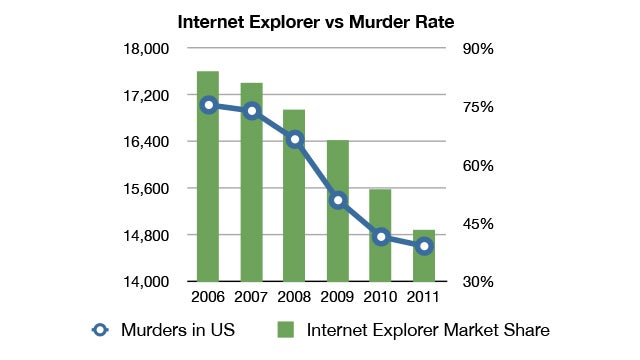
But I think the author should follow up and interview convicted murderers to see whether they actually use IE vs. Chrome or Firefox...
Quote: MathExtremist...But I think the author should follow up and interview convicted murderers to see whether they actually use IE vs. Chrome or Firefox...
My first thought is to phrase it "Microsoft is murder". I'm sure my average blood pressure decreased after buying a Mac.
Quote: 98ClubsDoes this mean that the Corollary, "Western Civilization is NOT in decline: Microsoft is", is holding true???
This brings to mind something Peter Thiel said, something like, "Technology is always progressing for a sufficiently narrow definition of 'technology'" (the dangers of slowing innovation is a theme he tries to spread)
Quote: socksThis brings to mind something Peter Thiel said, something like, "Technology is always progressing for a sufficiently narrow definition of 'technology'" (the dangers of slowing innovation is a theme he tries to spread)
We're running up against a physical barrier in the quest to continue innovation. Our brains can only learn at a given rate, but with each passing generation there's more to learn. At some point we'll reach a level of technology that requires a lifetime of learning in order to make new contributions. We're obviously not there yet, but consider the age of the average Nobel Laureate (55 in Physics, 58 in Chemistry, and trending upward), and then consider that Blaise Pascal was only 31 when he invented probability theory in 1654.
Given that trend, we have two choices. One is to figure out an alternate approach to learning, like neural copying. Put your head in a machine, press a button, now you know college-level physics. This and related technologies are in initial stages of research, but we're nowhere close. The other is to figure out how to extend both human lifespan and brain health. Those are more active areas of research but aren't solved problems. I suppose a third choice would be the transhumanist one, integrating our brains with technology to enable additional memory or processing power.
But all of those seem unlikely to occur before the technological singularity, so perhaps we don't need to worry about solving that problem. It may well be that the problem will be "solved" for us.
For example, as a software engineer, I can develop new algorithms and build new systems without understanding how metal (which is used to build a computer) is extracted from the ground, or how a hard drive works (physically), or how any of the electronics in my computer work, or even really more than the basics of how my operating system works. I don't need to understand how the country's power grid works, or how the battery that is powering the laptop works.
Obviously someone needs to understand these things, but no one person needs to understand all of it.
Quote: AxiomOfChoiceIt's not really clear that that's true. We don't need to understand everything that came before us in order to make contributions....
I second this. In particular, I think design has a lot to offer, possibly as a way to consolidate fundamental technological gains. We are, of course, seeing this in programming today as people have to deal with Moore's law running thin (wrt headline speeds, if not transistor counts), and people are revisiting lots of old ideas that can take advantage of both cumulative speed gains as well as ongoing transistor count gains.
A big part of Thiel's pitch is also that we've seen continued progress in the less regulated world of bits while the world of stuff has seen lots of regulation and correspondingly little innovation.
To both points, NASA declined and the space industry saw some deregulation, Musk/SpaceX saw an opportunity and made extraordinary gains simply by making a rocket that could land. I'm not saying there weren't technological innovations necessary for this to happen, but it seems to me that the advance was mostly one of design and opportunity from deregulation.
Quote: AxiomOfChoiceIt's not really clear that that's true. We don't need to understand everything that came before us in order to make contributions.
For example, as a software engineer, I can develop new algorithms and build new systems without understanding how metal (which is used to build a computer) is extracted from the ground, or how a hard drive works (physically), or how any of the electronics in my computer work, or even really more than the basics of how my operating system works. I don't need to understand how the country's power grid works, or how the battery that is powering the laptop works.
Obviously someone needs to understand these things, but no one person needs to understand all of it.
That's all true, but you're really talking about layers upon layers of applied science, and making contributions in different, perhaps derivative fields, rather than the original one. The battery example is a good one, because there was just recently a battery breakthrough involving a Li-Ion battery that doesn't spontaneously combust. You're not going to be able to make a breakthrough in battery technology without studying a lot of chemistry, just like you're not going to solve P=NP without studying a lot of computer science. You might be able to use the results of others' studies into chemistry or computer science to accomplish new things in entirely new fields, but that's not the sort of progress I'm talking about. I'm talking about progress of the basic sciences and fundamental research, where you actually do need to understand much of what came before in order to make contributions.
So yes, I agree that knowing how to build a tool is not a prerequisite for knowing how to use it. I can't make non-stick cookware, but I can make pancakes with it. The issue isn't whether I can cook new things, but whether someone else can continue building better non-stick cookware.


